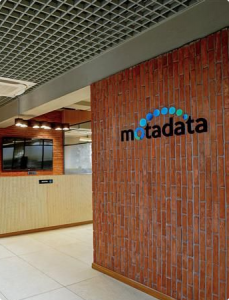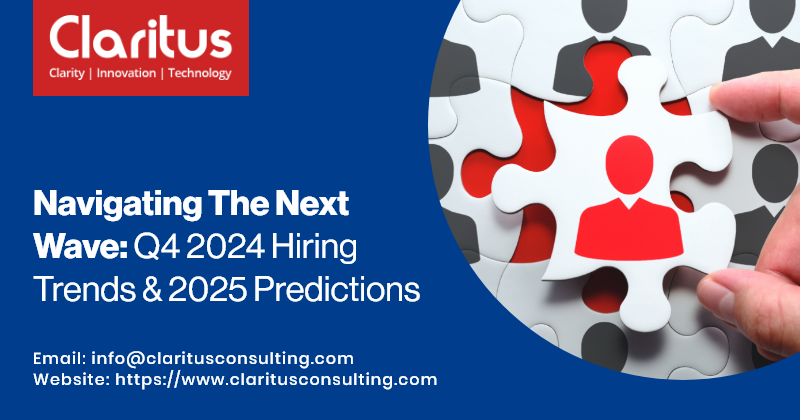Recruitment Trends for Q4 2024 & Hiring Outlook 2025
The recruitment landscape is evolving at a rapid pace, influenced by economic shifts, technological advancements, and changing workforce expectations. Q4 2024 saw significant trends shaping the hiring process, and as we step into 2025, recruiters and HR leaders must stay ahead of the curve to attract and retain top talent. Based on expert insights and data-driven analyses, here are the key recruitment trends from Q4 2024 and what to expect in 2025.
Key Recruitment Trends from Q4 2024
1. Surge in Skills-Based Hiring
The demand for skills-based hiring reached new heights in Q4 2024. With companies prioritizing skills over traditional qualifications, 78% of employers reported preferring skills assessments over degree requirements. Industries like IT, healthcare, and manufacturing increasingly focused on micro-credentials, boot camps, and certifications over conventional degrees.
2. AI and Automation in Recruitment
Artificial intelligence (AI) and automation continued to redefine hiring processes. Studies indicate that 65% of HR professionals incorporated AI-driven tools to streamline resume screening, candidate sourcing, and interview scheduling. Predictive analytics helped organizations identify high-potential candidates faster, reducing hiring time by 30% on average.
3. Rise of Hybrid and Remote Work Models
Q4 2024 confirmed that hybrid and remote work models are here to stay. Around 74% of companies offered remote work options, leading to an increase in global talent acquisition. This shift compelled recruiters to refine remote hiring strategies, invest in virtual onboarding, and leverage AI-driven collaboration tools.
4. Growing Importance of Employer Branding
With job seekers becoming more selective, employer branding played a critical role in attracting talent. Research showed that 86% of job seekers considered an employer’s brand and culture before applying. Companies with strong employer branding saw a 50% increase in applicant interest compared to those with weaker reputations.
5. Diversity, Equity, and Inclusion (DEI) as a Priority
DEI efforts remained a key focus, with 62% of organizations implementing targeted initiatives to enhance workforce diversity. Recruiters increasingly used AI to eliminate unconscious bias in hiring and adopted data-driven approaches to track progress in diversity hiring goals.
6. Increased Focus on Employee Retention
Retention strategies gained prominence in Q4 2024 as organizations faced higher turnover rates. A survey found that 69% of HR leaders prioritized internal mobility, career development programs, and employee well-being initiatives to reduce attrition.
Key Recruitment Forecasts for 2025
1. Expansion of AI-Driven Candidate Matching
As AI technology advances, 2025 will see a surge in AI-powered candidate matching. Algorithms will assess not just resumes but also soft skills, cultural fit, and career progression, making recruitment more precise and efficient.
2. Hyper-Personalization in Recruitment
Experts predict that recruitment marketing will become more personalized. Using behavioral analytics, HR teams will tailor job recommendations, communication styles, and interview experiences to each candidate’s preferences, improving engagement and conversion rates.
3. Growth of the Gig Economy
The gig economy is set to expand further, with freelance and contract-based roles expected to grow by 20% in 2025. Companies will adopt flexible hiring models to accommodate project-based work, and platforms facilitating gig work will see increased investment.
4. Sustainable and Ethical Hiring Practices
With ESG (Environmental, Social, and Governance) principles gaining traction, 2025 will witness a greater emphasis on sustainable hiring. Organizations will focus on ethical labor practices, transparent hiring policies, and environmentally friendly workplace initiatives to attract socially conscious talent.
5. Data-Driven Hiring Decisions
Data analytics will become a cornerstone of recruitment strategies. Predictive analytics will help companies anticipate workforce needs, while real-time dashboards will provide insights into hiring trends, employee performance, and retention rates.
6. Increased Adoption of Blockchain in Recruitment
Blockchain technology is set to revolutionize recruitment by ensuring transparent and tamper-proof verification of credentials. HR leaders expect blockchain adoption in background checks and resume validation to streamline the hiring process and reduce fraudulent claims.
7. Greater Emphasis on Mental Health and Well-Being
Workplace well-being will be a priority in 2025, with organizations investing in mental health programs, flexible work policies, and stress management initiatives. Companies that actively promote employee well-being will see higher engagement and lower turnover.
8. Integration of Virtual Reality (VR) in Hiring
VR and augmented reality (AR) will enhance candidate assessment and onboarding experiences. Companies will use VR-driven simulations to evaluate job-specific skills, making hiring decisions more effective and immersive.
The Bottom Line
The recruitment landscape is evolving rapidly, driven by technological advancements, shifting workforce expectations, and economic trends. As we move into 2025, organizations that embrace AI, data analytics, and skills-based hiring will gain a competitive edge. HR leaders must prioritize employer branding, employee well-being, and ethical hiring practices to attract and retain top talent. By staying agile and leveraging emerging recruitment technologies, businesses can build a resilient and future-ready workforce.










